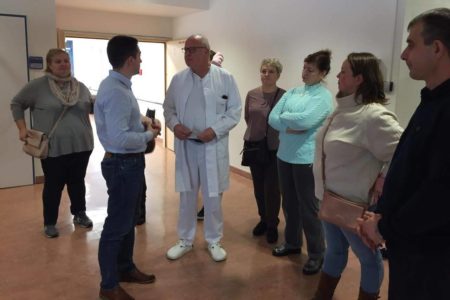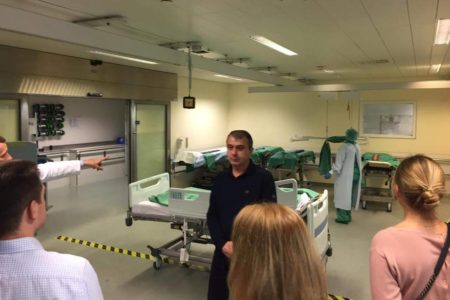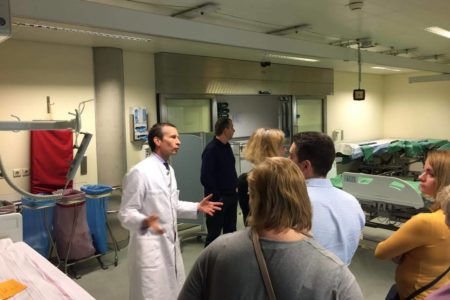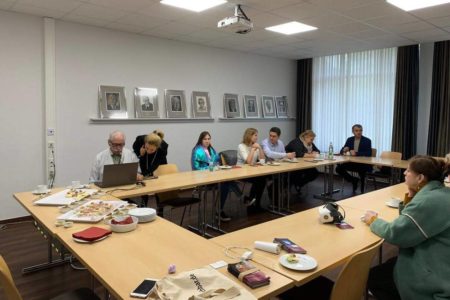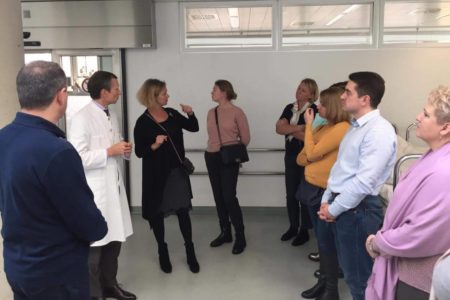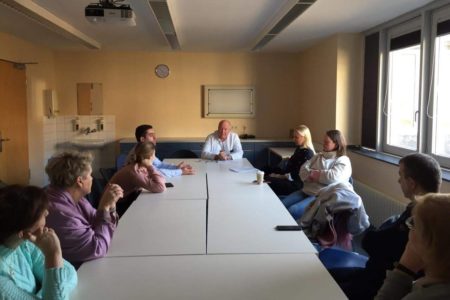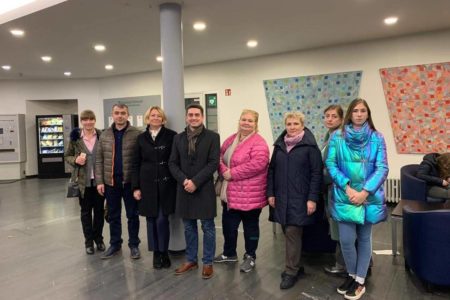From 18th to 21st of November representatives of private medical institutions from Moscow visited the international trade show MEDICA 2019 and took part in the continuing education program prepared by INTAMT. During the program, specialists visited a number of specialized medical institutions in the Dusseldorf region.
In particular, the Clinic of General, Cardiovascular and Children’s Surgery at the University Hospital Dusseldorf, where its director, Prof. Knöfel, spoke about its work and his tasks as an administrative and medical director. Answering one of the questions of Moscow’s specialists about the personal responsibility of a doctor when deviating from clinical protocols and guidelines, Prof. Knöfel said the following: “Sometimes it is advisable to deviate from verified clinical protocols to give the patient an additional chance to recover,” he described the clinical case of a patient who should have received palliative chemotherapy treatment for multiple colorectal carcinoma metastases under the protocol. The so-called in-situ-split liver surgery was discussed and approved at the clinical conference instead. As a result of this non-standard, individual treatment, the clinic doctors were able to achieve complete removal of all tumor foci. This would not have been possible with standard therapy.
The visit to the Eye Clinic began with a fascinating story by Dr. Menzel, Head of Lions Cornea bank NRW. The guests from Moscow were also told and demonstrated how to obtain, prepare and transplant donor corneas. After that, the ultra-modern operating theatres of the clinic were shown. Due to the fact that nowadays the majority of eye surgeries are successfully performed in outpatient conditions, there are a lot of private clinics in Dusseldorf and its surroundings, offering operations both on the front and the back of the eye. “The University Hospital “gets” the most difficult cases when hospitalization and special experience of doctors is needed” – explained to the guests Professor Girling and Professor Guthof, the director of the clinic.
The visit of the University Hospital ended with a visit to the Neurosurgery Clinic. The new director of the clinic, Prof. Henggi, led the guests through the operating unit. Although the equipment of the operating theatres is one of the best in the world, the plans to expand surgery capabilities impressed the Russian colleagues. For example, the director plans to use artificial intelligence in neurosurgical operations. Great interest was aroused by the hospital-wide central system of sterilization, delivery and return transport of used instruments and materials.
At the Clinic for Women’s Diseases, a group of specialists was met by Dr. Lux and one of the senior doctors and deputy head, Professor Fehm. The colleagues discussed the current problems of gynaecology and obstetrics and visited the operating facillities.
Professor Engelmann, Director of the Clinic for Children’s Diseases at the Lucas Hospital in the neighbouring city of Neuss, introduced the work of the Clinic for Children’s Diseases to the guests in Moscow. There was a lively discussion on the subject of mandatory vaccinations – unlike in Russia, in Germany the decision on vaccinations is up to the parents. Measles vaccination became mandatory just recently, early November 2019. When asked, whether parents should be legally obliged to vaccinate their children, Prof. Engelmann replied that the most important thing is to educate them. It is very important to get parents’ understanding of the advisability of vaccination, not to conduct vaccination by force. In Neuss County, despite the voluntary nature of these procedures, about 99% of children are vaccinated.
The visit to St. Elisabeth Mönchengladbach-Reidt Municipal Hospital was the final one in this short but very intensive visit program of Moscow physicians. Professor Sabin, one of Germany’s leading cardiologists, spoke about the possibilities of modern cardiac diagnostics and the work of the clinic under his supervision. One of the topics of his report was the use of telemedicine. Professor Sabin talked about the use of event recorders in cardiology, as well as new, almost fantastic at first glance, virtual circumvention possibilities. This project is in the pilot stage, but now doctors can use special glasses and chips to remotely measure a person’s pulse, palpate the abdomen and measure blood pressure.
Inspired by the impulses received during the busy days of the MEDICA trade fair and participation in the INTAMT Academy CPD program, the participants returned to Moscow full of impressions and new ideas.


